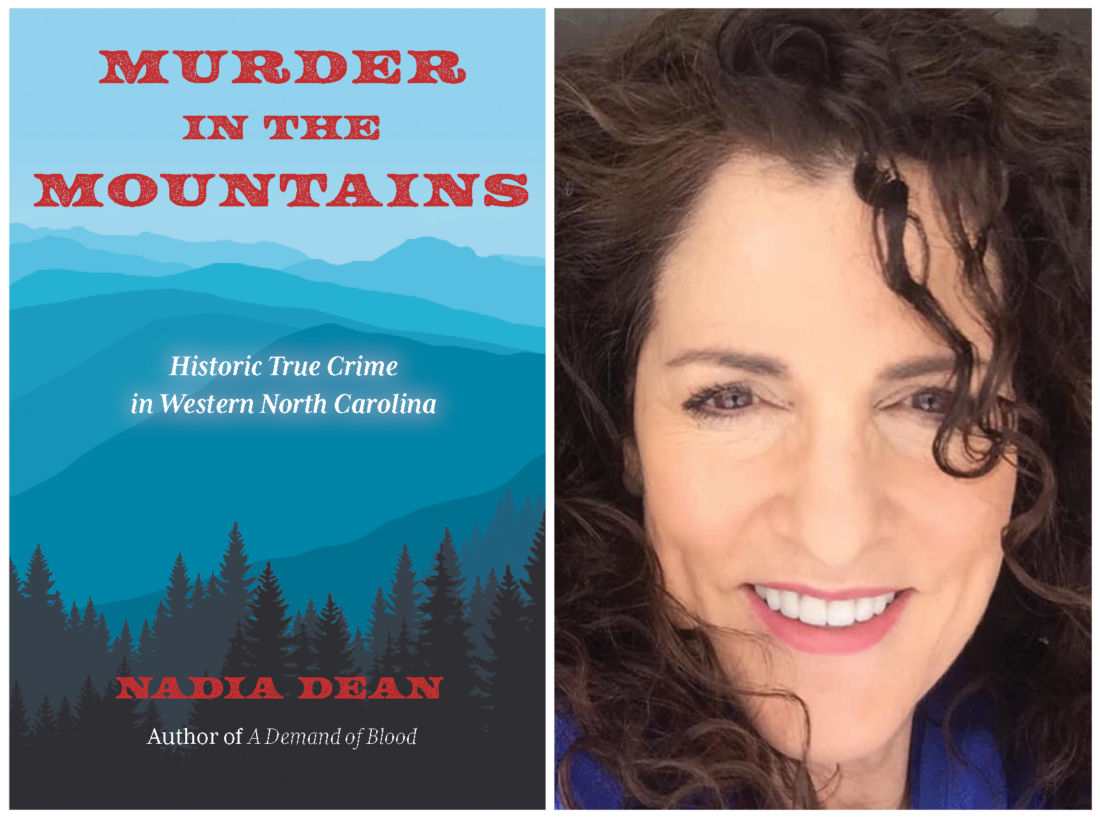There’s no telling what Western North Carolina resident Charles York thought in 1885 as he stabbed to death his brother John. Furthermore, it’s unclear if Charles realized his 6-year-old nephew, William, witnessed the murder of his father. But one thing is for sure: Charles never could have imagined that 130 years later, his nephew’s great-granddaughter would be scanning old newspapers to piece together his crime and eventual escape from the Asheville jail.
But at the start of the COVID-19 pandemic, that’s precisely how local author Nadia Dean spent her time, scouring the online database newspapers.com in search of anything she could find about the fratricide. In the process, the author discovered a number of other fascinating murders that made headlines centuries before but have since faded over time.
Her latest book, Murder in the Mountains: Historic True Crime in Western North Carolina explores 10 such tales, including her family story. Going beyond mere bloodshed, the accounts also shed light on the roles of alcohol, racism, honor and vengeance in the shaping of the region’s violent past.
“As I searched for compelling stories from the history of the Smoky Mountains, I found a common thread that runs through all of them,” Dean writes in her author’s note at the start of the book. “Resentments allowed to grow out of control, in the end, control everything.”
Whom God pardons
From the opening chapter, “Emotional Insanity,” Dean’s book makes clear that even the most civilized can succumb to murderous rage and that a community’s interpretation of the law is often swayed, if not corrupted, by cultural norms.
In 1851, such was the case when a long-standing feud between William Waightstill Avery and Samuel Fleming escalated first to a physical attack and later murder. The two men both represented the western part of the state in the North Carolina House of Commons. Despite clashing political philosophies, what ultimately propelled them into a violent and deadly exchange began after Fleming cowhide-whipped Avery for accusations of fraud amid a legal dispute.
“Since cowhiding was seen as a tool of authority over slaves, Southern white men felt it carried extra dishonor when applied against a white man,” Dean writes in the book. “One newspaper at the time wrote, ‘A man might bear the fist of another, or his cane; or any other weapon without dishonor except a cowhide, for to no other does such a stigma attach itself as to that.’”
Therefore, the paper concluded, “‘any man who cold-bloodedly cowhided another forfeited his right to live.’”
Within a month of the attack, Avery shot and killed Fleming inside Morganton’s courthouse. Fleming’s death left his five children without a father. And though Avery turned himself in, a jury quickly acquitted the killer of the crime.
In his closing argument, Avery’s attorney, John Bynum, stated what many at the time felt about a man’s right to reclaim his honor through murder: “No doubt God forgives Mr. Avery. And whom God pardons, men dare not punish.”
Precursors to more violence
Along with stories of murder, Dean’s 10 chapters are filled with historical asides that place the events in a broader context. In Chapter 8, “The Lynching of Bob Brackett,” for example, the author details the ubiquity of lynch mobs in the 19th century following the Emancipation Proclamation.
“In North Carolina alone, there were one hundred and sixty documented lynchings,” Dean writes. “North Carolina’s attorney general began keeping track of crime statistics in 1889, and in the years that followed, there were more lynchings than legal executions in the state.”
Other historical factoids offer glimpses into the emergence of the Ku Klux Klan in WNC, the evolution of the state’s death penalty and a former social event known as “court week,” which involved a weeklong open market where goods were sold and entertainment had.
But, as Dean makes clear, not everyone approved of the annual gathering. U.S. senator and Asheville native Augustus S. Merrimon wrote in an 1853 diary entry, “Scores of women attend this court for the sole purpose of drinking and pandering to the lustful passions of dirty Men.”
Through such asides, Dean offers readers much-needed levity amid otherwise brutal and heavy tales. Yet, the book’s main stories also provide a number of plot twists that will keep readers entertained and surprised.
But ultimately, Dean views Murder in the Mountains as a warning. “I think these stories are important because they illustrate that human nature has to be corralled,” she says. “Especially today when you look at how uncivilized people are with each other and how easy it is to sit behind a keyboard and type a really nasty and hateful thing that you wouldn’t have the nerve to say to someone’s face. These are the kinds of precursors to more violence.”




Before you comment
The comments section is here to provide a platform for civil dialogue on the issues we face together as a local community. Xpress is committed to offering this platform for all voices, but when the tone of the discussion gets nasty or strays off topic, we believe many people choose not to participate. Xpress editors are determined to moderate comments to ensure a constructive interchange is maintained. All comments judged not to be in keeping with the spirit of civil discourse will be removed and repeat violators will be banned. See here for our terms of service. Thank you for being part of this effort to promote respectful discussion.